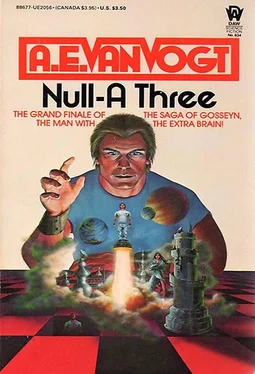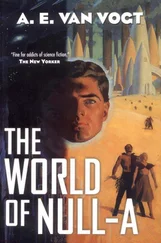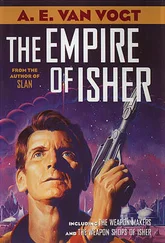Alfred Van Vogt - Null–A Three
Здесь есть возможность читать онлайн «Alfred Van Vogt - Null–A Three» весь текст электронной книги совершенно бесплатно (целиком полную версию без сокращений). В некоторых случаях можно слушать аудио, скачать через торрент в формате fb2 и присутствует краткое содержание. Жанр: Фантастика и фэнтези, на английском языке. Описание произведения, (предисловие) а так же отзывы посетителей доступны на портале библиотеки ЛибКат.
- Название:Null–A Three
- Автор:
- Жанр:
- Год:неизвестен
- ISBN:нет данных
- Рейтинг книги:3 / 5. Голосов: 1
-
Избранное:Добавить в избранное
- Отзывы:
-
Ваша оценка:
- 60
- 1
- 2
- 3
- 4
- 5
Null–A Three: краткое содержание, описание и аннотация
Предлагаем к чтению аннотацию, описание, краткое содержание или предисловие (зависит от того, что написал сам автор книги «Null–A Three»). Если вы не нашли необходимую информацию о книге — напишите в комментариях, мы постараемся отыскать её.
Null-A 3 is destined to become an instant classic — a mind boggling galaxy-spanning adventure!
Null–A Three — читать онлайн бесплатно полную книгу (весь текст) целиком
Ниже представлен текст книги, разбитый по страницам. Система сохранения места последней прочитанной страницы, позволяет с удобством читать онлайн бесплатно книгу «Null–A Three», без необходимости каждый раз заново искать на чём Вы остановились. Поставьте закладку, и сможете в любой момент перейти на страницу, на которой закончили чтение.
Интервал:
Закладка:
—As if this boy emperor’s brief sojourn inside the blackness of the capsule had triggered, for the first time in years… caution.
“Your majesty—” Gosseyn spoke quietly—“my suggestion is that, until your scientists find out how your special control of energy operates in this area of space, use that extra part of your brain only when it is absolutely necessary.”
Surprisingly, the boy was silent. Did it mean that he was having a rational thought?
The answer to that question, Gosseyn realized grimly, was compounded by several negative aspects. The human cortex, where the ability to reason was believed to reside—and he accepted that it did—normally required until about age 18 V2, earth time, to become physically fully developed.
Alas, the imperial boy was visibly about age 12 or 13. Five or more long earth years would have to pass before he could have the necessary brain equipment. And yet, though boys of 12 were impulsive, they could learn. They could grasp ideas. They could learn, particularly, to practise restraint.
Maybe right now this boy was getting his first real lesson in self-control.
Gosseyn sighed inwardly, vaguely hopeful, as those thoughts flashed through his mind. Because, recalling the scared courtiers, the subservient military personnel, and, in fact, everybody he had met so far, it was about time.
During those moments of Gosseyn’s private thoughts, the boy continued to stand. His face remained slightly twisted.
And there was no question: something was about to happen.
Was there anything Gilbert Gosseyn Three could do to channel in some acceptable fashion the strange combination of courage and incomplete brainpower that confronted him in the person of this youngster who, by inheritance, had the right to command the 178,000 men on this warship.
Standing there, Gosseyn realized what was the real cause of his uncertainty: he had no personal life experience to help him determine what a 12-year-old might do.
Neither he nor the earlier Gosseyns had any recollection of ever having been a boy? True, those predecessors, having both been on earth, and on other human-occupied planets, had watched children in various circumstances; and the memory of that was now in the mind of Gosseyn Three.
But what they had observed seemed to be mostly children at play. Children competing in games of sport. That was the basic awareness now. Competition within the frame of games of all kinds.
That had to be it. Hey!
In its way it had been a lightning swift mental survey of the situation. And so, abruptly, not waiting for that incomplete brain to arrive at some wrong conclusion; and, in fact, abandoning the courtesy that was due this superboy. Gosseyn spoke without waiting for permission.
He said, “I’ll bet I can hold my breath longer than you can.”
There was a distinct silence in the room. Gosseyn Three had time to be aware of adult retainers in uniform and other formal attire, stiffening, and looking—yes—startled.
Then: “I’ll bet you can’t,” said the boy emperor.
Whereupon, without waiting, he gulped in a large mouthful of air. His lungs expanded. His cheeks puffed out.
And, Gosseyn Three, responding immediately, did the same thing.
There they stood. And at first the man was thinking: Well, that’s one minute or so I’ve gained before—what?
Presumably, for about sixty seconds he had headed off a contest with more serious implications: the Gosseyn extra-brain contesting again with what was, apparently, some equivalent brain power possessed by a few people (families) from wherever these people had come; one of the possessors being the boy.
With each passing second, Gosseyn became more vividly aware of how idiotic this little contest must seem to the onlooker. And yet, of course, since their emperor was involved, no one dared react adversely.
There, each person stood, frozen, like the two contestants. Of the thirty or so men, not counting the guards in the background, only three—though they also did not move—seemed to be sizing up the situation speculatively.
Gosseyn could see the Draydart and Four, and a third man to one side, all three with their faces reflecting inner scheming. Seeing him looking at them, their eyes shifted. And then the third man turned back, and, deliberately seeking eye contact with Gosseyn, moved his lips, and framed the words: “Let the emperor win.” That was a problem which Gosseyn had already started considering. What would be best for dealing with the boy? A swift glance at the young emperor showed that his eyes were bulging, his face looking strained.
It was the moment for decision. With a gasp, Gosseyn exploded his own breath in the room. And bare instants later the boy did the same. But he yelled delightedly, “I won! I won!”
Gosseyn, having a fully developed cortex—at least so he had reason to believed—had already had a series of second thoughts. Accordingly, he gulped a few mouthfuls of air, smiled his acceptance of defeat, and said, “It’s the power of being young. But I’ll bet there are games I can beat you at.”
The goodlooking child face still needed a few more quick breaths. But it was already lighting up.
“I’ll bet you can’t beat me at Scroob,” said the 12-year-old finally. “My mother doesn’t want to play with me anymore because I’m too good for her.” Gosseyn said, “I’d have to see what kind of game it is before I argue with you. But maybe we can try a game after I’ve been assigned living quarters and get a chance to eat some food.” He added, “After all, it’s time that a decision be made that I should be treated like a guest and not a prisoner; since I assure you I am quite willing to help your scientists in any way that I can.”
It was the only way he could think of to postpone an immediate challenge. And obviously, if he could win the kind of reprieve he requested, it was the best.
He was glad, then, to see that everybody looked relieved, as the boy said, “Okay, later.”
The young emperor thereupon turned to the man who had, in effect, whispered to Gosseyn to “let the emperor win”, and said in his boyish voice, but firmly, “Breemeg, find him living quarters in the—” it was one more new word; it sounded like “… palomar. And then—” the boy continued, “after he’s eaten, bring him to to the… Place.”
That was the way that final word seemed to be pronounced: The Place.
The courtier, Breemeg, was bowing. “Very well, your majesty, it shall be done immediately.”
The young emperor was turning away. “That’s where I’ll be, myself.”
Gosseyn stood quietly with the others, as the boy walked off into the alcove, and out of sight.
CHAPTER 6
The journey to… Palomar… started out on the double. As if his guide, the suave courtier, Breemeg, realized, also—as had the other guides before him—that this interlude had better be brief.
As he sped along another lengthy corridor at his fastest stride short of running, Gosseyn nevertheless took the time to glance at his companion. Breemeg’s profile, earnest, intent, had the same pointed, slightly over-sized nose as he had noticed in the others. The skin coloring was the same white as earth whites, but something was subtly different; maybe it was too white, virtually bloodless. The mop of golden hair on top of the head seemed to be a physical quality common to one of the human types among these people, the other being the brown hair of Four.
Right now, Breemeg’s was a face with a clenched jaw and eyes narrowed, as if some unpleasant thought was working through the man’s mind.
Since Gosseyn could not know what these thoughts were until they were expressed, he took the rest of the brief journey in stride, so to speak. And he was not surprised when, presently, Breemeg and he went through a door into—it had to be—
Читать дальшеИнтервал:
Закладка:
Похожие книги на «Null–A Three»
Представляем Вашему вниманию похожие книги на «Null–A Three» списком для выбора. Мы отобрали схожую по названию и смыслу литературу в надежде предоставить читателям больше вариантов отыскать новые, интересные, ещё непрочитанные произведения.
Обсуждение, отзывы о книге «Null–A Three» и просто собственные мнения читателей. Оставьте ваши комментарии, напишите, что Вы думаете о произведении, его смысле или главных героях. Укажите что конкретно понравилось, а что нет, и почему Вы так считаете.











